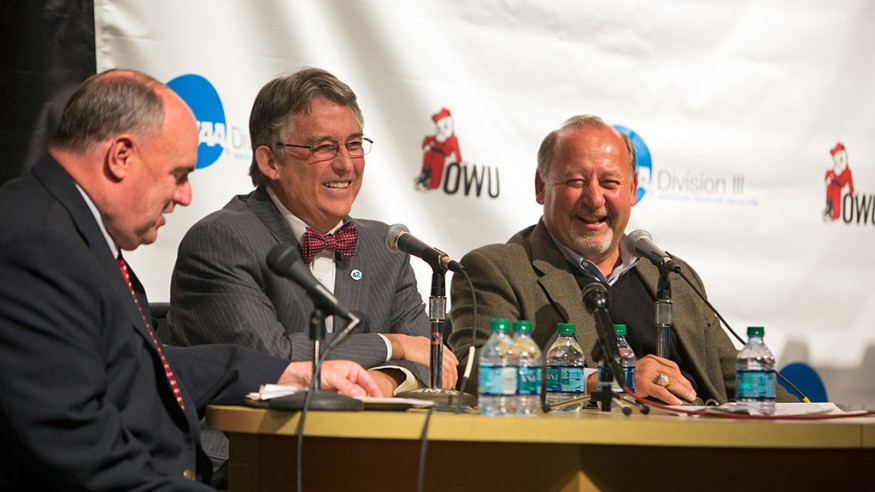
Celebrating Branch Rickey, Jackie Robinson, and ‘42’
Branch B. Rickey and Bob DiBiasio discuss the state of baseball today and the Branch Rickey-Jackie Robinson legacy during an April 12 roundtable at Ohio Wesleyan. OWU Athletics Director Roger Ingles (left) serves as moderator. (Photo by Mark Schmitter ’12)
Ohio Wesleyan alumnus and Major League Baseball executive Branch Rickey’s selection of Jackie Robinson to break professional baseball’s color barrier, was careful and intentional, says Rickey’s grandson, Branch B. Rickey. The 1967 OWU graduate spoke at a roundtable discussion last Friday at Ohio Wesleyan in Phillips Hall.
Rickey, OWU graduate and president of Minor League Baseball’s Pacific Coast League, joined fellow alumnus Bob DiBiasio ‘77, senior vice-president for public affairs of the Cleveland Indians, and OWU athletic director Roger Ingles to talk about the “Great Mahatma’s” legacy as depicted in the new film “42: The True Story of an American Legend,” starring Harrison Ford and Chadwick Boseman.
Rickey said his grandfather “was looking for an athlete that could excel, who would set an example, and who would not strike back.” He found such a player in Robinson, who accomplished more than he is usually credited with.
“Jackie did not break a barrier,” Rickey said. “He shattered a myth. He went from not being allowed to participate—and this, I think is representative of myths in society on so many fronts…—but he went from not participating to excelling. He didn’t just put on a uniform and sit on the bench. He went from not participating to being Rookie of the Year.”
While Robinson received much harassment when he was signed, Rickey said his grandfather also received threats, but his wife hid the intimidating letters before he saw them. Rickey said his female relatives told him about the incidents years later.
“Those letters were not going to impede her any more than she was going to let them worry him,” he said.
While Robinson faced most of the public difficulty, Rickey said he feels his grandfather deserves “some piece of the pie” for mentoring him.
“This transcended a business relationship—this became a partnership,” he said. “…(T)his is such a classic example that has been handed down as an example to me as interfacing between people that don’t have anything in common and forge that common ground.”
Rickey said his grandfather often told the story of black OWU baseball player Charles Thomas being denied his own room at a hotel. The elder Rickey said he found Thomas in their shared room saying, “If I could just rub this color off, I’m as good as any man.” Rickey said that image stuck with him.
“When you’re hearing that as a six-year-old, seven-year-old, eight-year-old, it makes a very deep impression,” he said.
DiBiasio said the Indians’ Larry Doby, another black player who signed a major-league contract in 1947, faced “a little bit more unique” situation than Robinson, who had played in the minor leagues and signed with the Dodgers when he was 27, while Doby was given a big league chance more quickly at age 22.
”There was a two-year drumroll for Jackie Robinson, and Larry Doby just showed up,” DiBiasio said.
According to DiBiasio, Cleveland was a ready home for an integrated team, since the Negro Leagues had a strong presence there. Rickey said Brooklyn was also fertile ground because it was a “melting pot” for African-Americans, immigrants and other marginalized populations.
Rickey and DiBiasio said both the elder Rickey and Indians general manager Bill Veeck, who signed Doby, challenged baseball’s status quo. Many owners were opposed to integrate the game because they thought challenging its cultural traditions would be bad for business.
“No one wanted to risk the ongoing strength of our franchise for an experiment,” Rickey said.
DiBiasio and Rickey both spoke about their continued relationship with Ohio Wesleyan. DiBiasio said his connection to the University is important to him because his time as a student prepared him well for the professional world.
“The foundation of a 35-year career started here, so if the phone rings you have to pick it up, out of a sense of duty,” he said.
The discussion ended with a question from the audience about how the elder Rickey would feel about the continued racism in professional sports. Rickey said “42” serves as a reminder of the struggle for racial equality.
“I think it’s going to take everybody that is of good heart and good character to continue to work on this, and no problems—society has never solved all its problems,” he said. “They just continue to reoccur in different shape or form, and I think that’s why education is so important…I think that would be my grandfather’s attitude—he would never quit working on it.”
Branch B. Rickey shares a moment with the brothers of Delta Tau Delta. The men met Rickey at the Strand Theatre on April 12 — the day ’42’ opened nationally. (Photo by Steve Leibrand)
Read more about the OWU and Delaware celebration of the Rickey-Robinson legacy and debut of the feature film, “42”.
